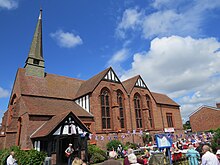St John's Church, Birkdale
| St John's Church | |
|---|---|
 Celebration of the Queen's 90th Birthday, 18 June 2016 | |
| 53°37′22″N 3°00′50″W / 53.6228°N 3.0138°W | |
| OS grid reference | SD 330,145 |
| Location | St John's Road, Birkdale, Southport, Merseyside |
| Country | England |
| Denomination | Anglican |
| Churchmanship | Conservative Evangelical |
| Website | St John, Birkdale |
| History | |
| Status | Parish church |
| Architecture | |
| Functional status | Active |
| Heritage designation | Grade II |
| Designated | 29 July 1999 |
| Architect(s) | Paley, Austin and Paley Austin and Paley |
| Architectural type | Church |
| Style | Gothic Revival |
| Groundbreaking | 1889 |
| Completed | 1910 |
| Specifications | |
| Materials | Brick with terracotta and sandstone dressings Red tiled roofs |
| Administration | |
| Province | York |
| Diocese | Liverpool |
| Archdeaconry | Warrington |
| Deanery | North Meols |
| Parish | St John, Birkdale |
| Clergy | |
| Vicar(s) | Revd Jeremy Leffler |
St John's Church is in St John's Road, Birkdale, Southport, Merseyside, England. It is an active Anglican parish church in the deanery of North Meols, the archdeaconry of Warrington, and the diocese of Liverpool.[1] The church is recorded in the National Heritage List for England as a designated Grade II listed building.[2]
History
St John's was built in 1889–90, and designed by the Lancaster architects Paley, Austin and Paley. The church cost £3,000 (equivalent to £420,000 in 2023),[3] and provided seating for 318 people.[4] It was enlarged in 1909–10 by Austin and Paley who added a north aisle with an arcade, and vestries. This cost £2,000 and added 186 seats.[5]
Architecture
Exterior
The church is constructed in brick, with dressings in glazed brick and terracotta, and some timber framing.[2] The roofs have red tiles, and the bellcote has a spirelet clad with green Westmorland slate.[6] The architectural style is Arts and Crafts with some Perpendicular details. The plan of the church consists of a nave with north and south aisles, a south porch, a chancel with a chapel to the south and a north vestry, and a bellcote at the west end. The aisles embrace double transepts. On the south side is a timber-framed porch with a square three-light window to its right. The transepts have a central buttress, with a tall, three-stage, two-light window on each side of it. On the west side of the transepts, and in the apexes of the gables, is timber studwork. In the south wall of the chapel is a square three-light window.[2] The west window has six lights, and the east window, five lights;[2] These windows are in Decorated style, with terracotta mullions, and sandstone tracery.[6] The bellcote contains two-light windows, surmounted by a broach spire, with a metal finial.[2]
Interior
Inside the church the brickwork is exposed, The arcades are carried on Perpendicular-style red sandstone piers without capitals springing into brick arches. The authors of the Buildings of England series consider that the stained glass in the east window is by Barrowclough and Sanders, and that elsewhere there are windows by Abbott and Company, and by Shrigley and Hunt.[6] The three-manual organ was built in about 1893 by Rushworth and Dreaper of Liverpool.[7]
See also
- Listed buildings in Birkdale
- List of works by Paley, Austin and Paley
- List of ecclesiastical works by Austin and Paley (1895–1914)
References
- ^ St John, Birkdale, Church of England, retrieved 16 October 2011
- ^ a b c d e Historic England, "Church of St John, Birkdale (1379771)", National Heritage List for England, retrieved 16 October 2011
- ^ UK Retail Price Index inflation figures are based on data from Clark, Gregory (2017), "The Annual RPI and Average Earnings for Britain, 1209 to Present (New Series)", MeasuringWorth, retrieved 7 May 2024
- ^ Brandwood et al. 2012, p. 237.
- ^ Brandwood et al. (2012), p. 247
- ^ a b c Hartwell & Pevsner (2009), p. 639
- ^ "NPOR [N09332]", National Pipe Organ Register, British Institute of Organ Studies, retrieved 29 June 2020
Bibliography
- Brandwood, Geoff; Austin, Tim; Hughes, John; Price, James (2012), The Architecture of Sharpe, Paley and Austin, Swindon: English Heritage, ISBN 978-1-84802-049-8
- Hartwell, Clare; Pevsner, Nikolaus (2009) [1969], Lancashire: North, The Buildings of England, New Haven and London: Yale University Press, ISBN 978-0-300-12667-9
- Church of England church buildings in Merseyside
- Grade II listed churches in Merseyside
- Churches completed in 1910
- 19th-century Church of England church buildings
- Gothic Revival church buildings in England
- Gothic Revival architecture in Merseyside
- Anglican Diocese of Liverpool
- Paley, Austin and Paley buildings
- Austin and Paley buildings
- Buildings and structures in Southport
- Conservative evangelical Anglican churches in England

